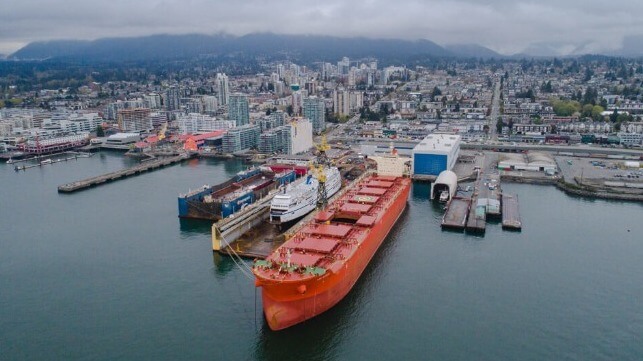Tugboat Strike at Canada’s BC Ports Spreads to Vancouver Shipyard

The two-week-old strike against one of Canada’s largest tugboat operators, Seaspan ULC, continues to slow vessel movements in British Columbia and this week grew to also impact the company’s shipyard operations. The latest developments came as business leaders citing strains on the supply chain and reputational damage to the region appealed for both sides to return to the negotiating table.
A ruling last week by Canada’s Labor Relations Board cleared the way for the striking captains to extend their picket lines to other parts of Seaspan’s operations. Nearly 1,000 unionized trade workers at the company’s North Vancouver shipyard refused to cross the picket lines of the Canadian Merchant Service Guild which represents the captains and engineers that operate Seaspan’s tugs and barges. Work at the company’s shipyard came to a halt impacting ongoing projects, including the construction of two supply ships in a joint project for the Canadian Navy and Canada’s new offshore science research vessel being built for the Coast Guard.
The picket lines were also seen at the company’s headquarters. It represented an expansion of the walkout which began on August 25 after the union and Seaspan failed to reach a new collective bargaining agreement with the captains of its more than 30 tugboats servicing ports in the province including Vancouver and Victoria. The company is one of four tugboat companies for the ports and is one of only two operators for fuel barges in the area.
“As union brothers, we cannot cross this picket line, we will not cross a picket line, ever,” Toby Charette, president of the Marine and Shipbuilders Union, told The North Shore News in Vancouver, Canada. “So we’re standing out here waiting for Seaspan, to come to terms and bargain in good faith with the guild. And give them what they deserve. Very plain and simple,” said Charette whose union represents the welders, pipefitters, electricians, and other trades at the shipyard.
Earlier in the strike, cruise ships had found themselves delayed in Vancouver by the strike. At the end of August, Celebrity Cruises’ Celebrity Eclipse was delayed by 20 hours by a fuel barge. After placing the barge alongside the cruise ship, the crews refused to remove it forcing the cruise ship to remain overnight at the pier in Vancouver much to the frustration of passengers on the 7-day cruise. The barge was finally repositioned permitting the cruise to sail. Disney Cruise Line experienced a similar delay for the Disney Wonder also due to sail from Vancouver on an Alaska cruise.
Port officials in Vancouver had predicted that ship movements were less likely to be impacted by the strike because of multiple providers but warned of potential delays in fuel movements. They report that on average 14 ships a day require escort and berthing help from tugs in the port.
Last week, the Canadian Chamber of Shipping spoke out against the strike saying it was increasing congestion at the Port of Vancouver and further straining supply chains at a time when Canadian goods, commodities, and energy are in high demand. They also said that the disruption is tarnishing Vancouver's reputation as a home port for cruise lines and a primary gateway to Asian markets.

that matters most
Get the latest maritime news delivered to your inbox daily.
"We encourage the parties to urgently return to the bargaining table and find sustainable solutions," stated the Chamber's President, Robert Lewis-Manning. "Canada's supply chain cannot afford additional congestion that negatively impacts Canadian businesses and results in increased impacts to local coastal communities, especially from ships at anchor awaiting to load at terminals.”
The Chamber also called upon the Vancouver Fraser Port Authority to facilitate the safe transit, docking, servicing, and undocking of ships in the port.
